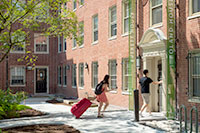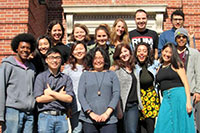|
|
Dear Brown families,
We write from deep within second semester with a few updates on life around College Hill.
As students resumed classes after a well-deserved spring break, they also began to plan for the year ahead. As you’ll see in this newsletter, pre-registration for fall semester begins soon. Please encourage your students to meet with their advisors so as to ensure a reflective approach to building meaningful academic pathways. Such active reflection is an essential part of taking full advantage of Brown’s Open Curriculum. Academic deans and advisors are available in open office hours Monday – Friday in University Hall as a resource for students looking for additional guidance with this process.
April also can be a period of increased stress given the amount of activity on campus and the approach of finals, so encourage your students to reach out to the wide range of support resources available to them. If your student isn’t sure where to begin or has general questions or concerns, deans in Student Support Services or open hours with deans in the Dean of the College are great places to start.
We also hope your students are thinking carefully about their summer plans and how to link their education with their off-campus experiences. CareerLAB has a wide range of posted internships as well as potential funding options for those who have secured unpaid opportunities.
Many thanks for all you do to encourage and support your students while they are on campus.
Warm wishes,
Eric S. Estes
Vice President for
Campus Life
& Student Services |
Maud S. Mandel
Dean of the College |
|
|
 |







|
|
RESOURCE HIGHLIGHT
|
University life brings with it challenges in many areas. CAPS works with approximately one-quarter of Brown students each year and is continuously innovating in order to provide the best care to students. The goal at CAPS is to help students work through their concerns in a way that is compassionate and efficient so that they can continue to engage in both their academic program and the University community. CAPS provides crisis intervention, short-term individual therapy, referral services, psychoeducational and support groups, and community outreach. Appointments are free of charge, contacts with students are confidential, and services are available to all currently enrolled students.
We say to students every chance we get: Asking for help is a sign of strength—make use of all the resources available to you at Brown!
|
|
|
ACADEMIC HIGHLIGHT
 |
New course designation—DIAP Courses: Race, Gender, and Inequality
Course designations identify offerings in a specific area of the curriculum, often uniting a coherent body of knowledge. For nearly thirty years, Brown has had a course designation that underscores the University’s commitment to the intellectual study of race/racial formations, inequality, and social justice. Many institutions highlight the importance of this area of inquiry with a “diversity requirement.”
|
|
By contrast, Brown’s Open Curriculum provides students with opportunities, rather than mandates, for deepening their intellectual engagement with the pressing questions that surfaced in Pathways to Diversity and Inclusion: An Action Plan for Brown University (DIAP) concerning how to create “more just, diverse, and inclusive communities in our classrooms and world.”
The Task Force on Diversity in the Curriculum recommended that the current course designation “Diverse Perspectives in Liberal Learning” be re-examined. After much discussion and an open feedback period for the Brown community, the College Curriculum Council approved the new title: “DIAP Courses: Race, Gender, and Inequality,” which will go into effect beginning in fall 2018. These courses will examine issues of structural inequality, racial formations and/or disparities, and systems of power within a complex, pluralistic world. With the inclusion of “DIAP,” the new title links the revised course designation to the University’s broader Diversity and Inclusion Action Plan.
Students will not be required to enroll in DIAP courses, but they will be encouraged to take at least one DIAP course during their time at Brown.
|
|
|
ON THE HORIZON
 |
Pre-registration and Advising
Brown’s Open Curriculum relies on a strong commitment to academic advising. Faculty and peer advisors support students in navigating and taking full advantage of the curricular offerings. After Spring Break, students who will be continuing at Brown will meet with their advisors to check in on how the current semester is progressing and to discuss courses for next semester. Students who are considering |
|
summer coursework may also use this time to learn more about summer study.
Pre-registration for Fall 2017 occurs April 18 – 25. Students who wish to enroll in summer 2017 classes may register for those March 31 – April 13 and then again April 26 – June 28.
|
 |
Commencement: May 28
Commencement and Reunion Weekend is a time of great ceremony, pageantry, and rejoicing. Friday night brings Campus Dance (tickets required); Saturday includes Baccalaureate (which is optional for students); and Sunday opens with the Commencement procession in the morning and concludes with diploma ceremonies in the afternoon (comfortable shoes are advisable). The Commencement |
|
website is full of details—including a presentation about “Understanding Commencement,” accessibility accommodations for guests (some requests are due by May 1), and a schedule for the weekend.
|
 |
Housing for 2017 – 2018
After their first year at Brown, students select on-campus housing through several phases of the housing selection process. Students may choose to join a Greek Letter Organization or a Program House, choose special interest housing, or be selected as a Residential Peer advisor and be assigned a room. Most students enter the housing lottery to select a room. Some enter individually to select a |
|
single room, and others enter with a friend or group of friends to select housing together. Detailed information about the housing lottery and the schedule is available on the Residential Life website.
Students must apply for permission to live off -campus. The off-campus permission process begins in September for the following year’s housing; students who are semester-level eligible to live off campus receive email from Residential Life with instructions and application deadlines.
|
 |
Residence Halls Close May 20, 2017 at Noon
Residence halls close Saturday, May 20, at noon for all students except graduating seniors. Students must vacate their rooms and return keys by this time. If extenuating circumstances require a student to seek housing past that date, a request for extended housing may be submitted to the Office of Residential Life. Students received this information by email on March 15. |
 |
Brown in Washington D.C.
In January 2017, the Swearer Center for Public Service launched the Brown in Washington, D.C. program, featuring a course co-sponsored by the Watson Institute for International and Public Affairs. Students accepted to this competitive program spend a semester in Washington, D.C. during their junior or senior year interning with public and nonprofit sector agencies and completing coursework |
|
complementing their internship placement. The Swearer Center invites undergraduate students (second semester sophomores, juniors, and seniors) from all concentrations to apply for Fall 2017. The application deadline is April 13.
|
|
|
DID YOU KNOW?
 |
Studying “independently” at Brown
One of the benefits of the Open Curriculum is that students have opportunities to create their own courses and even their own concentrations. Independent Studies are available in three different formats: Independent Study Projects (ISPs), Group Independent Study Projects (GISPs), and Academic Internships (AIs) are credit-bearing courses in which students explore a topic not part of
|
|
Brown’s curriculum. ISPs and GISPs are credit-bearing courses in which students explore a topic not part of Brown’s curriculum. At times, these courses produce work that has a wider influence on departments and/or the curriculum. AIs incorporate hands-on experience at an organization as part of a course. Independent Concentrations (ICs) allow students to combine their interests and focus on a particular theme through a clearly articulated and cohesive area of study. Examples include: Happiness, Migration Studies, and Neuroeconomics.
Students engaging in independent study receive support and guidance from the Curricular Resource Center for Peer Advising (CRC), which just celebrated 40 years at Brown!
|
 |
President Paxson on Brown within the federal policy landscape
In recent months, several federal actions have prompted leaders of colleges and universities across the country to contribute to national discussions about issues affecting higher education. Brown President Christina Paxson recently shared her thoughts on four policy areas that have been a focus of Brown’s advocacy and attention:
|
|
research funding, transgender issues, immigration policies, and Brown’s role in a politicized landscape. Communications from the President and the Provost to the campus community are posted on their respective websites.
|
|
|
Other comments, questions or ideas?
We welcome your feedback via email at families@brown.edu and via mail at Brown Parents Program, Box 1893, Providence, RI 02912, USA.
|
|
|
|
|
|